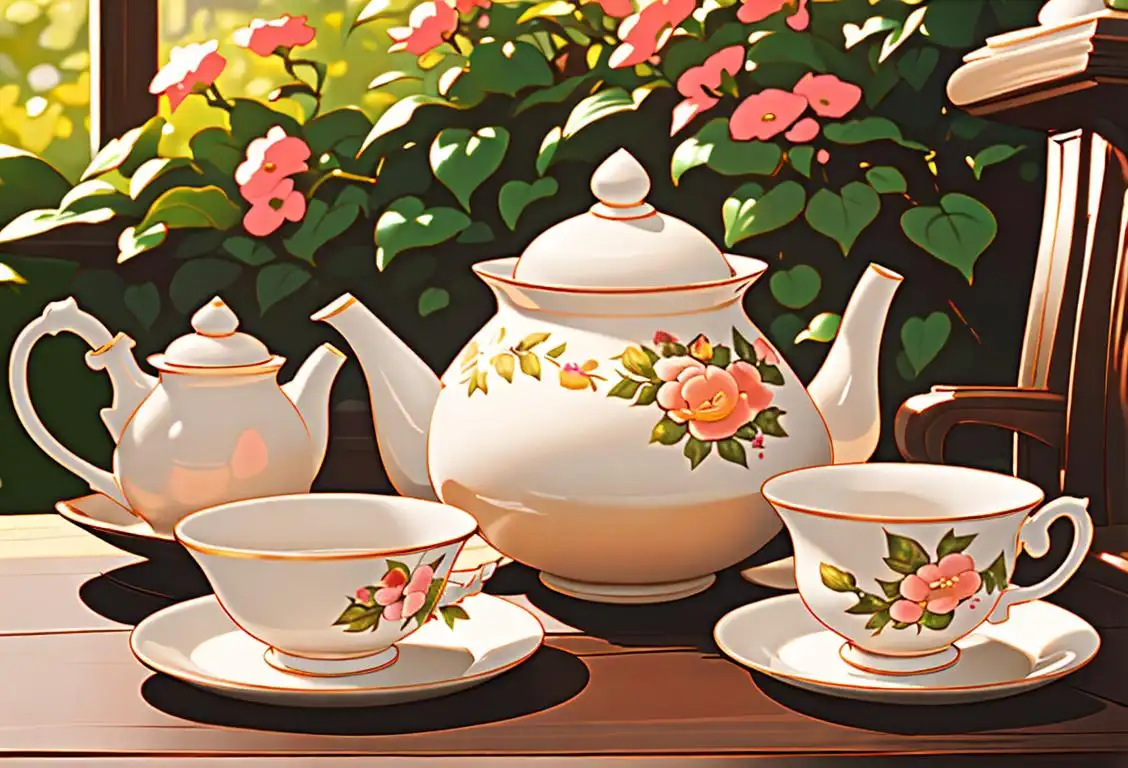National Cup Of Tea Day

Welcome to National Cup of Tea Day! Grab your teapot and get ready to celebrate this delightful day dedicated to our favorite hot beverage. Whether you prefer it with milk, sugar, or just a splash of lemon, tea has been a beloved drink for centuries. Let's dive into the history of this comforting elixir and explore why it deserves a special day of its own.
When is Cup Of Tea Day?
It's national cup of tea day on the 20th April.
The Origins of Tea
Tea, oh glorious tea! Its origins date back thousands of years to ancient China. According to legend, the Emperor Shen Nong was sitting beneath a Camellia sinensis tree (the plant from which tea leaves are harvested) when a leaf fell into his cup of hot water. Intrigued by the aroma, he took a sip and was instantly captivated by the delightful taste. And lo and behold, tea was born!
Centuries later, tea made its way to other parts of the world, thanks to explorers and traders. The British, in particular, embraced tea with open arms and made it an integral part of their culture. The afternoon tea tradition, complete with finger sandwiches and scones, became a staple of English society.
Fast forward to modern times, and tea has become a global phenomenon. From classic black teas to refreshing green teas and exotic blends, there is a tea for every palate and mood. People around the world cherish their tea breaks, using it as a moment to relax, gather with friends, and recharge.
Celebrating National Cup of Tea Day
On National Cup of Tea Day, tea enthusiasts come together to celebrate their love for this amazing beverage. Here are a few fun ways you can join in the festivities:
- Host a tea party with your loved ones. Decorate the table with colorful teapots, teacups, and saucers. Don't forget the delicious treats like scones, biscuits, and cucumber sandwiches!
- Expand your tea horizons by trying new varieties and blends. Go beyond your usual favorites and explore the world of herbal infusions, fruit teas, and spiced chai.
- Indulge in some self-care with a calming cup of tea. Light a scented candle, put on some soothing music, and let the worries of the day melt away as you sip your hot brew.
- Join a tea tasting or workshop to learn more about the art and science behind tea. Discover the different flavors, aromas, and brewing methods that make each cup unique.
Did You Know?
Did you know that tea is the second most consumed beverage in the world, second only to water? That's right! People all over the globe can't get enough of this comforting drink. So raise your teacup high and toast to the wonders of tea!
History behind the term 'Cup Of Tea'
1598
Introduction of tea to England
The year 1598 marks the introduction of tea to England, when the first shipment of tea leaves arrived in London. The tea was brought from China by a Dutch explorer named Jan Huygen van Linschoten. Initially, tea was consumed by the wealthier classes as a luxury item and a symbol of status.
1657
The rise of tea houses
In 1657, the first tea house in England, known as the 'Chinese Coffee House,' was opened in London. This establishment catered specifically to the growing fascination with tea and provided a place where people could gather to enjoy a cup of tea. Tea houses quickly became popular social hubs, attracting intellectuals, businessmen, and artists.
1706
Thomas Twining opens the first tea shop
Thomas Twining, a merchant and entrepreneur, opened the first tea shop in London in 1706. This marked a significant shift in the accessibility of tea. Previously, tea had primarily been consumed in social establishments like tea houses. Twining's tea shop allowed individuals to purchase tea for consumption at home, making it more widely available and affordable.
1840
The 'Five o'clock Tea' tradition
During the 19th century, the tradition of the 'Five o'clock Tea' emerged in England. This custom involved serving tea and light refreshments in the late afternoon, providing a social break between lunch and dinner. The 'Five o'clock Tea' quickly became a popular activity among the upper classes and played a role in shaping British culture and society.
1939
Widely adopted idiom 'Not my cup of tea'
The idiom 'Not my cup of tea' gained popularity in the 20th century. While the exact origins are unclear, it is believed to have originated in Britain. This phrase is commonly used to express one's disinterest or lack of preference for something. It has become a widely recognized and frequently used expression in the English language.
Did you know?
Did you know that tea is the second most consumed beverage in the world, second only to water? That's right! People all over the globe can't get enough of this comforting drink. So raise your teacup high and toast to the wonders of tea!Tagged
romance awareness food loved onesFirst identified
21st April 2017Most mentioned on
20th April 2018Total mentions
13Other days
Awareness Day
Action Day
One Day
Prayer Breakfast Day
Opposite Day
Vodka Boyfriend Day
Kissing Fried Chicken Day
Happiness Day
Suicide Prevention Month Day
Family Day









